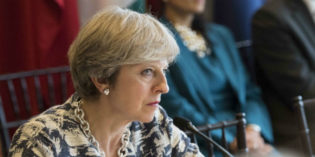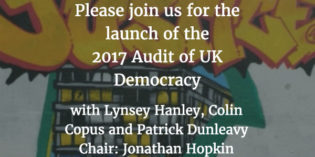Achieving accountable government

Audit 2017: How democratic is the Brexit process?
Many political and constitutional steps are needed in order to for the UK to leave the European Union, after 44 years as a full member. Cumulatively they form one of the biggest constitutional changes in British history, and one dogged by intense controversy and disputes. As part of our 2017 Audit of UK Democracy, Joelle Grogan examines […]

Heath, Brown and now May: how ‘serious, details-oriented’ PMs fail
As the Conservative conference drew to a close in Manchester, Theresa May was still struggling to unite her party. Ben Worthy (Birkbeck University of London) looks at the reasons why Prime Ministers fail and how the same qualities that are lauded in a new PM often explain their failure. Like May, Gordon Brown and Edward Heath […]

Join us at the LSE for the launch of our 2017 Audit of UK Democracy
On Thursday 12 October at 6.30pm Democratic Audit is launching our 2017 Audit of UK Democracy at the LSE with a discussion of the Grenfell disaster’s lessons for local government, public housing and social justice. Speakers include Lynsey Hanley, the author of Estates: An Intimate History, Prof Colin Copus and Prof Patrick Dunleavy, the co-director of Democratic […]

Why is it taking so long to appoint a new Intelligence and Security Committee?
For the past five months the Intelligence and Security Committee has been in abeyance. Yet its job of scrutinising the work of the security agencies is even more vital at a time when Britain is regularly attacked by terrorists. Andrew Defty (University of Lincoln) asks what is delaying the appointment of a new committee, and […]

Why defend democracy? Because the job of pursuing justice belongs to everybody
When we think about how to vote, writes Jeffrey Howard (University College London), we have a duty to try to achieve justice for everybody – not just ourselves. Victoria Woodhull, the first woman to run for US president. Photo: Public domain Similar PostsHow Covid-19 is altering our conception of citizenshipBook Review | Capitalism, Alone: The […]

Book review | Handbook on Political Trust, ed. Sonja Zmerli & Tom W G van der Meer
In Handbook on Political Trust, edited by Sonja Zmerli and Tom W G van der Meer, an international body of 41 experts offers an excellent overview of the scholarly literature on political trust, complemented by original empirical research and analysis. Across the chapters, the authors pinpoint gaps in the literature and identify new venues for research, making this handbook […]

Audit 2017: How effective is the Westminster Parliament in scrutinising central government policy-making?
The House of Commons is one of the oldest and foremost legislatures in the world – yet in the past it was also a byword amongst political scientists for weak legislative control of government. Recently some revisionist authors have painted a more active picture of MPs’ influence. As part of our 2017 Audit of UK […]

Smile or smirk? Why non-verbal behaviour matters in parliamentary select committees
When witnesses appear before select committees, Hansard records their words – but not their expressions. Cheryl Schonhardt-Bailey (LSE) analysed nonverbal behaviour in 12 economic policy committee hearings, including some in which George Osborne gave evidence. In some of the hearings with Osborne, he appears to be smirking; in others, his smiles appear genuine. She argues that […]

Book review | Popular Democracy: The Paradox of Participation, by Gianpaolo Baiocchi & Ernesto Ganuza
In Popular Democracy: The Paradox of Participation, Gianpaolo Baiocchi and Ernesto Ganuza examine contemporary forms of participatory governance by tracing the origins and development of participatory budgeting (PB) from its roots in Porto Alegre, Brazil, to its adoption in two cases, Cordoba, Spain and Chicago, USA. While acknowledging that PB has been seen as being too easily co-opted by neoliberalism, the […]



 Democratic Audit's core funding is provided by the Joseph Rowntree Charitable Trust. Additional funding is provided by the London School of Economics.
Democratic Audit's core funding is provided by the Joseph Rowntree Charitable Trust. Additional funding is provided by the London School of Economics.